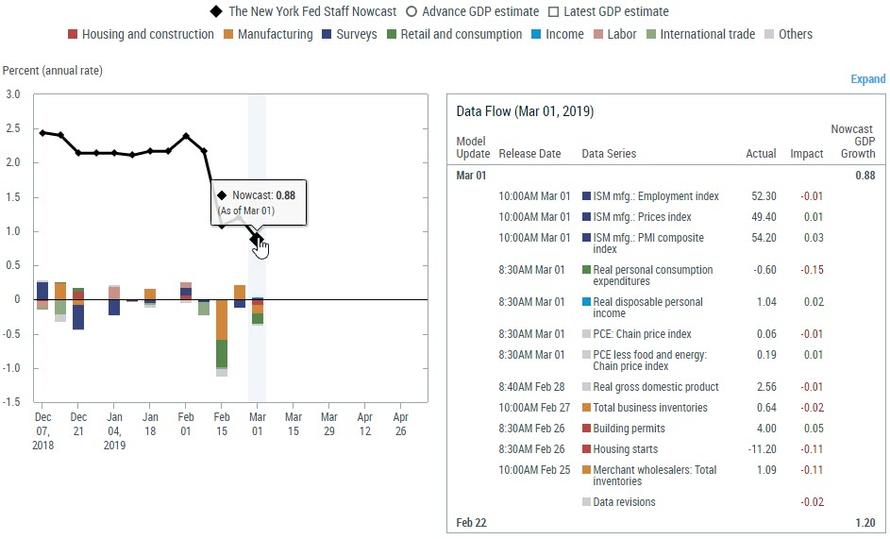While the market was delighted on Thursday to see a delayed Q4 GDP print of 2.6%, which came in well above the expected 2.2% consensus number, we warned that “while Q4 was clearly a stronger than expected print, the real question is what happens in Q1, when most banks and nowcasts expect GDP to print below 1%, in some cases concerningly so.”
Moments ago we got confirmation of precisely this, when following the latest dismal economic data including a 2 year low in the manufacturing ISM, a miss in UMich Consumer Sentiment, and a near record plunge in personal spending, Goldman launched its Q1 GDP tracking estimate at a paltry +0.9%. This forecast, as Goldman’s chief economist Hatzius said, “reflects an expected drag from inventories, sequentially slower consumption growth, a decline in residential investment, and a four-tenths drag from the government shutdown.”
It wasn’t just Goldman, because at roughly the same time, the NY Fed’s GDP Nowcast, which was launched to counter the Atlanta Fed’s famous GDP tracker, crumbled from 1.22% last week (and 2.17% as recently as a month ago), to a stunning 0.88%, as a result of big declines in Personal Consumption, Housing Starts, Wholesale Inventories, and others.
And speaking of the Atlanta Fed, it also just released its latest Q1 GDP nowcast, and it’s a doozy, with the initial estimate coming just barely positive at only 0.3%, to wit:
The initial GDPNow model estimate for real GDP growth (seasonally adjusted annual rate) in the first quarter of 2019 is 0.3 percent on March 1. The initial estimate of fourth-quarter real GDP growth released by the U.S. Bureau of Economic Analysis on February 28 was 2.6 percent, 0.8 percentage points above the final GDPNow model nowcast released the previous day.
It appears that now assured Q1 earnings recession won’t be in isolation, with the broader US economy now on the verge of contracting, if only for just one quarter. The question then becomes whether China’s massive reflation attempts are successful, and lead to a rebound in US growth in the second quarter. If not, what was expected to become the longest US expansion in history in June 2019, will be prematurely terminated by a technical recession just as Donald Trump was set to make a new economic record.
via ZeroHedge News https://ift.tt/2tKKtcT Tyler Durden
